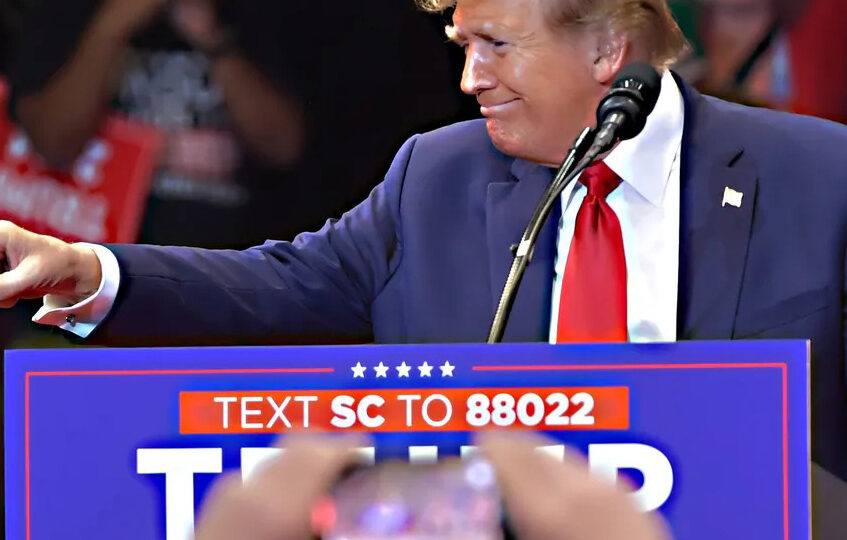Students, faculty, and alumni react to the former President’s return to power.
November 14, 2024
Donald Trump will be the 47th President of the United States. Trump has been re-elected to office after an eventful four years, during which he was subject to thirty-four felony counts, two impeachments, two assassination attempts, accusations of insurrection, and a slew of scandals and charges.
After his victory, Trump said he is “committed to unifying the nation and bringing forward a ‘Golden age of America.’” Many of Winthrop’s students, faculty, and alumni spoke to the Johnsonian about their expectations, and their concerns.
“I feel like the country has only become more divided and people have adopted a more ‘Us vs. Them’ ideology, which will only get worse,” said Will Moore, a junior. “As far as unifying the nation goes, I’m skeptical.”
Another student, Camille Bailey, expressed disappointment in the reactions she has seen online. “The lack of diversity in political opinions has stunted our tolerance for those who believe differently.”
In the days immediately following the election, social media platforms like Yik Yak and Instagram became outlets for people to express their feelings.
One anonymous post said, “At this point, if you are not enraged by the outcome of this election, I do not trust you.”
Another user said, “If you are voting for Trump, just know you are on the wrong side of history.”
Speaking about these comments, Bailey said, “This approach we’re taking is going to further radicalize both sides. If we continue, we’ll never have a candidate that can represent what we believe as a nation.”
Some are afraid that Trump will follow through on his promises of “retribution” against what the President-elect dubbed “the enemy within,” vowing to use the military and government against his perceived enemies. He campaigned on a controversial policy of mass deportation for undocumented immigrants, restrictive trade policies, and tax-cuts.
A group of Winthrop alumni spoke to the Johnsonian, worried about the future. “I think the reason people are so stressed and so anxious and so upset is because we’re living in such deep uncertainty. To wake up everyday and have no idea what’s going to happen − I mean, businesses alone don’t know what’s going to happen next year.” During his campaign, Trump regularly talked about placing enormous tariffs on imports, a plan that economists have railed against for being inflationary.
“[Businesses] are having to completely change their business models right now. Do they need to buy a bunch of materials ahead of time? Do they need to be careful with their payroll? What should they invest in? What should they not? I think everybody wakes up not knowing.”
Trump successfully flipped all seven battleground states and won the popular vote – which had not been done by a Republican since George W. Bush in 2004.
In 2016, Trump notably won the Electoral College, but lost the popular vote to then Democrat nominee, Hillary Clinton. The unexpected result in 2024 has prompted many to reflect on the Harris campaign, and to wonder where it went wrong.
Scott Huffmon, the Executive Director for the Center for Public Opinion and Policy Research at Winthrop University, offered his explanation for Trump’s victory.
“This was a pocketbook election,” he said.
For millions of voters, inflation decided how they would cast their ballot. Baseless conspiracies about migrants and threats of political retribution mattered less than the price of eggs and bread.
“There’s just no way to explain to the public the nuances [of the economy]. People are just patting their wallet and feeling that it’s thinner. If you’re explaining, you’re losing.” Trump campaigned on the cost of living, and often pointed a finger at the now-cooled effects of inflation.
The Winthrop alumni offered their explanation: “The United States is just not ready to have a woman as an American President. She was a woman. And of color. I think it really went against her, but there will be another time.”
The aftermath of a disastrous debate between then nominee President Biden and Trump thrusted Vice-President Kamala Harris into the spotlight. After Biden bowed out of the race, Harris quickly secured enough Democrat electors to become the Party nominee. It fell onto her to accomplish in four months what most candidates have two years to do.
“She ran a two-year campaign in four months. We’ve never seen anything like this. She also raised a billion dollars in three months. They had to do a lot of really difficult work in a short period of time,” said Adolphus Belk, a Professor of Political Science and African American History.
Belk, who has a doctorate in government and politics, also highlighted Trump’s strong performance with minorities. Much of Trump’s success could be explained by an uncanny ability to tap into the electorate’s anger. “White guys can’t be the only people who are angry about the economy, immigration, crime and drugs. They were able to siphon off enough support from those black voters, particularly black men, in the right places. They did well with Latino men nationally. And there is nothing inherent about being a woman that makes it a liberal cause, or being a black person, or a Latina, that makes it a liberal cause.”
It remains to be seen whether the ‘Politics of Rage’ that propelled Trump to another term indicates new battlelines in the electorate or is further evidence of Trump’s unique appeal.
“If I am a Democrat Party strategist, I’m concerned, because you’re showing some slippage here,” Belk said. “As much as you talk about the Republican Party being the party of Reagan, right now it’s not.”
The idea that the Republican Party had become the ‘Party of Trump’ was not unique to Belk. Huffmon shared a similar sentiment. “Ronald Reagan would not have imagined a Republican ever conceiving of pulling out of NATO or helping Russia take land from another country. He would be spinning in his grave over that.”
The promises that Trump made on the campaign trail have left many bracing for what is to be one of the nation’s most divisive and uncertain periods in its history. Trump will command the Senate, and Republicans are poised to flip the House of Representatives – although the Democrats still have a chance there. Protected from the legal troubles following his efforts to overturn the 2020 Presidential Election by a Republican majority Supreme Court, Trump will be in a position of massive, unchecked power. With victories in the Electoral College and the popular vote, he will have the authority to carry out his vision for America.
Despite the unprecedented nature of the election, it is more important than ever for students to stay involved in the democratic system.
“An election is a point in time,” Belk said. “Politics doesn’t end with the election. There are other ways to remain involved. If you’re upset about it and you want to make some change; dry your tears, take a moment to be upset, and start to figure out what you can do now to fight for the country you believe in.”
The Winthrop alumni who spoke to the Johnsonian, who had come to campus to celebrate Homecoming and their 60th reunion, had something to say to the student body. “We believe in the youth to change the future,” they said. “Maybe that’s what we need to say more often to them: Rather than we’re worried, to say we believe in you.”




